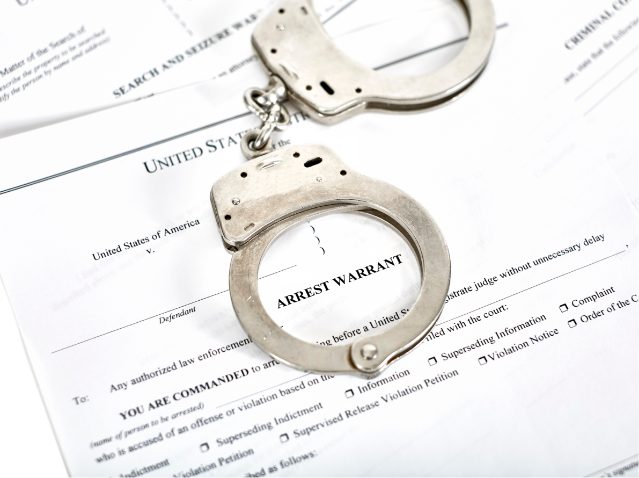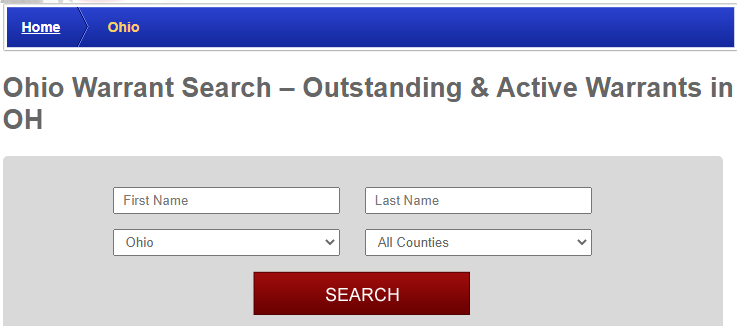
Copyright © 2024 · OurPublicRecords.org · All Rights Reserved

Enter A Name To View Anyone
We receive referral fees from partners (advertising disclosure)
The information we provide you is free of charge and a result of extensive research by our home warranty experts. We use affiliate links on our site that provide us with referral commissions. While this fact may not influence the information we provide, it may affect the positioning of this information.
The information we provide you is free of charge and a result of extensive research by our home warranty experts. We use affiliate links on our site that provide us with referral commissions. While this fact may not influence the information we provide, it may affect the positioning of this information.

We strongly advise that you read our whole set of recommendations below before conducting a warrant search in Ohio in order to achieve a successful outcome. You will be able to discover all of the information you require regarding Warrants in the state of Ohio on our website in a single convenient spot.

When a warrant of arrest is granted in Ohio, there are 3 scenarios that can occur: when a judge directs that the warrant be issued, when the prosecutor files a petition after an accusation against a suspect has been issued, and when an affidavit has been filed in court. This is done in accordance with Section 2941.36 of the state’s Code. As a matter of law in Ohio, if the warrant is addressed to the county sheriff where the indictment was discovered or where the complaint got filed the sheriff in question will be legally required to take the suspect into detention and present him before the court with jurisdiction over that county. When a judge who is allowed to issue active warrants uses electronic methods to authorize the serving of a warrant, the warrant is considered to be valid.

Thus, arrest warrants are commonly delivered to the appropriate law enforcement agency using electronic means such as fax, telegraph, teletype, and other similar technologies in Ohio.
In accordance with Ohio Code 509.10, arrests can be made both on the spot and with a warrant in hand. Simply said, whenever a criminal conduct is done in front of a cop, the officer is legally compelled to detain the offender even if no warrant is issued in the culprit’s name. This is known as “on view.” Additionally, when an agent of the law discovers that a warrant is outstanding against a particular person, the agent is legally required to arrest that person, even if the policeman does not have a copy of the warrant on him or her when making such arrests. In fact, a law enforcement officer has an obligation to bring all disturbances, felons, and other offenders of state laws before a court of competent jurisdiction. Additional responsibilities of policemen under this legal part include the suppression of unauthorized meetings and disturbances while maintaining public order in the surrounding community.
An individual who has been detained in line with the provisions of an outstanding warrant is immediately transported to the nearest available magistrate’s court for additional proceedings. The duration between incarceration and the bail hearing is rarely more than 48 hours, although the timeliness with which the arrestee is brought before the court will be governed by the bail hearings tribunal’s schedule, which will be published in advance of the hearing. If the court is not in session and the accused is charged with an ordinance violation, the accused may be brought before the clerk of court in accordance with sections 2937.22 through 2937.46 of the Code of Civil Procedure. At this stage, it is possible that this guy will be given bail. Whenever an arrest is made outside of the issuing county, the suspected criminal will be brought to the nearest convenient magistrate’s court or the clerk of court for further processing.
If a court finds it necessary to use an arrest warrant in Ohio, it is only one of many various types of legal tools that can be employed to resolve the disagreement. It is also common practice to use search warrants, subpoenas, summonses, and bench warrants to ensure that information flows smoothly throughout the trial, to make certain that the victim and the community are not jeopardized, and to ensure that the accused does not have an opportunity to flee the scene of the crime. As a result of the fact that court orders can be issued to bring information or persons who possess information before a tribunal, arrest warrants are also issued in Ohio against witnesses who fail to appear in court after being asked to do so by the court.

Organizations and persons who can perform a warrant search in Ohio are law enforcement agencies and employers who adhere to a strict set of rules set forth by the state legislature. A private citizen who is looking for arrest records and information on outstanding warrants will have to approach private marketers of criminal history information if he or she is looking for such information on their own. To acquire a personal background report, on the other hand, you must contact the clerk of court, the attorney general’s office, the sheriff’s department, or a magistrate’s court if you are compelled to do so as a condition of your employment. Additional services provided by the county clerk’s office include assistance in locating non-criminal case and court papers, among other things. Due to the fact that this organization is in charge of the compilation and maintenance of court dockets, you can acquire a wide range of information from them. As a result of going via the sheriff’s office, you will be able to look at the most wanted list for the area while you are waiting for the results of your background investigation to come back. By visiting the website of the Attorney General of the United States, you can communicate with the Bureau of Criminal Identification, which is in charge of the maintenance and dissemination of criminal history data, and learn more about their services. Only fingerprint investigations are currently available through the BCI at this time. The agency’s website has information on appropriate fingerprinting locations, as well as directions on how to submit this information to the agency.
Ohio criminal records are documents established by law enforcement and government entities that detail the conduct of individuals who have been charged with, or convicted of, criminal activity. Criminal records, sometimes known as rap sheets, contain a wide range of information about a person’s criminal history, including the facts of an indictment, an arrest, physical descriptors, dispositions (both pending and finalized ones), convictions, and more. Organizations at the state, county, and municipal levels provide the information for these records, which are then combined.
Arrest records in the state of Ohio refer to documents that contain detailed information regarding arrests as well as the suspects who were apprehended by law enforcement officers. They document certain facts of a suspect’s arrest and detention, but they are not normally kept on file as criminal records unless the arrest is followed by a criminal conviction. A person can be arrested in Ohio if they commit a misdemeanor, while it is more typical for them to be arrested if they commit a felony.
As a legal document in Ohio, arrest warrants are formal documents that are signed and issued by a judge, magistrate, or other members of the judicial branch. These documents give law enforcement the authority to apprehend a person who has been identified in the warrant. Arrest warrants are typically issued in response to a request from a member of law enforcement who has proof of criminal behavior on his or her person. Arrest warrants also grant permission for the search and seizure of private property for the purpose of locating and obtaining evidence. Generally, warrants are only valid for a single individual and for a specific period of time.
Disclaimer: OurPublicRecords mission is to give people easy and affordable access to public record information, but OurPublicRecords does not provide private investigator services or consumer reports, and is not a consumer reporting agency per the Fair Credit Reporting Act. You may not use our site or service or the information provided to make decisions about employment, admission, consumer credit, insurance, tenant screening, or any other purpose that would require FCRA compliance.

Copyright © 2024 · OurPublicRecords.org · All Rights Reserved